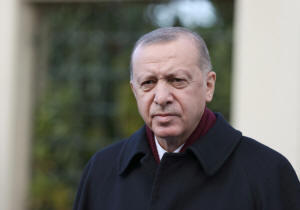U.S. sanctions NATO ally Turkey over purchase of Russian defense system
 Send a link to a friend
Send a link to a friend
 [December 15, 2020]
By Humeyra Pamuk and Tuvan Gumrukcu [December 15, 2020]
By Humeyra Pamuk and Tuvan Gumrukcu
WASHINGTON/ANKARA (Reuters) - The United
States imposed long-anticipated sanctions on Turkey on Monday over
Ankara's acquisition of Russian S-400 air defense systems, further
complicating already strained ties between the two NATO allies.
Turkey condemned the sanctions as a "grave mistake" and urged Washington
to revise its "unjust decision." It said sanctions would inevitably harm
mutual relations and threatened unspecified retaliatory steps.
Senior U.S. officials said in a call with reporters that Ankara's
purchase of the S-400s and its refusal to reverse its decision, despite
repeated pleas from Washington, left the United States with no other
choice.
The sanctions, first reported by Reuters last week, target Turkey's top
defence procurement and development body Presidency of Defence
Industries (SSB), its chairman Ismail Demir and three other employees.

The measures, which received a bipartisan welcome from the U.S.
Congress, were announced under the Countering America's Adversaries
Through Sanctions Act (CAATSA) - the first time the act has been used
against a fellow member of the NATO alliance.
Turkey's lira rallied about 1% as Washington opted not to adopt broader
sanctions but analysts said the move was still likely to weigh on the
Turkish economy, already in a coronavirus-induced slowdown and with
double-digit inflation.
Ankara acquired the Russian S-400 ground-to-air defenses in mid-2019 and
says they pose no threat to NATO allies. But Washington has long
threatened sanctions and last year removed Turkey from an F-35 jet
program.
Ignoring the advice of aides, President Donald Trump had resisted
imposing penalties on Turkey until giving the green light several days
ago, sources familiar with the matter said.
"The United States made clear to Turkey at the highest levels and on
numerous occasions that its purchase of the S-400 system would endanger
the security of U.S. military technology and personnel and provide
substantial funds to Russiaís defense sector," U.S. Secretary of State
Mike Pompeo said.
Briefing reporters, Christopher Ford, Assistant Secretary of State for
International Security and Nonproliferation, said Washington had sought
a solution but Ankara rejected all offers.
"This is not a step we've taken lightly or certainly quickly," he said.
Turkey says it has repeatedly proposed forming a joint working group
with the United States and NATO to resolve the issue but its offers have
not been fully utilised
The sanctions, near the end of Trump's presidency, are likely to weigh
on Ankara's ties with Democrat Joe Biden's administration when he takes
over as president next month.
[to top of second column]
|

Turkish President Tayyip Erdogan talks to media following the Friday
prayers in Istanbul, Turkey, December 11, 2020. Presidential Press
Office/Handout via REUTERS

CHILLING EFFECT
The sanctions will block joint projects or technology transfers
between U.S. companies and Turkish firms linked to SSB, said former
Turkish diplomat Sinan Ulgen, who heads the Istanbul-based Center
for Economics and Foreign Policy Studies think tank.
They also impose restrictions on loans and credits by U.S. financial
institutions to SSB totalling more than $10 million, while imposing
asset freezes and visa restrictions on the SSB president and three
other employees.
It is not immediately clear what impact the sanctions will have on
third countries such as European states that supply arms or defence
components and work with Turkish defence firms.
"Turkey's defence industry will be under stress for a while," said
Ozgur Unluhisarcikli, from the German Marshall Fund in Ankara.
"Whether there is a secondary sanctions aspect or not, it will have
a chilling effect on third countries as well."
But he said the impact on the wider economy would be less severe and
it was "very good that the uncertainty is being removed" after
sanctions had loomed for so long.
U.S. senators, both Republican and Democratic, hailed the move.
Animosity against President Tayyip Erdogan in the U.S. Congress has
deepened over the past year, a phenomenon Biden will have to
consider when dealing with Ankara.

"After watching President Trump repeatedly refuse to hold Turkey and
President Erdogan accountable, Iím glad to see this Administration
finally impose these required sanctions," Democratic Senator Chris
Van Hollen said.
"These measures send a clear message to Erdogan: we will not allow
him to undermine our national security and that of our faithful NATO
allies without consequence."
(Reporting by Humeyra Pamuk in Washington; Additional reporting by
Arshad Mohammed in Washington; Dominic Evans and Tuvan Gumrukcu in
Ankara and Jonathan Spicer in Istanbul; Editing by Timothy Heritage
and Matthew Lewis)
[© 2020 Thomson Reuters. All rights
reserved.] Copyright 2020 Reuters. All rights reserved. This material may not be published,
broadcast, rewritten or redistributed.
Thompson Reuters is solely responsible for this content. |